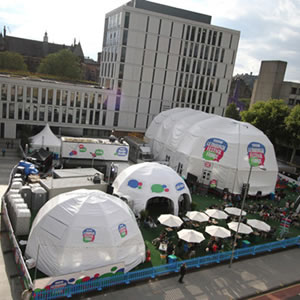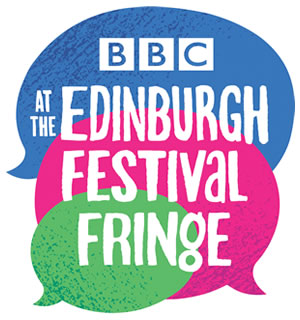Harry Deansway: The BBC is the real danger to the Fringe
British Comedy Guide has previously applauded the BBC for bringing Edinburgh Fringe comedy to the wider population via TV broadcasts. We think, in the process, this plants a seed in the minds of those who haven't visited the festival to give it a try. However, not everyone agrees that the BBC being at the Fringe is a good thing. Performer and promoter Harry Deansway delivers his viewpoint in this opinion piece.

After reading one of our greatest living stand-up comedians, Stewart Lee's, now yearly mawkish piece for the Guardian about the commercialisation of the Fringe, and how it was much better when all of Edinburgh was fields, and shows like Professor Nutty's Racist Flea Circus played to three people in a giant abandoned shoe at the bottom of Arthur's seat, I felt an urge to respond.
I've interviewed Stu a couple of times (I can call him Stu as he's done about 5 gigs for me) and if I see him in the street he will say 'hi', so I consider him, if not a friend, then an acquaintance. Actually, saying that, he's finally got all the critical acclaim and commercial success he deserves and won a British Comedy Award, and last time I saw him in the street he ignored me... Anyway, he makes some good points but in my opinion he completely skates over the true danger to the Fringe.
Lee's main gripes are the so-called 'big four' venues and the 'Etonian cabal' who run them. I dislike the 'big four' as much as the next man and I'm writing this piece in Stand owner Tommy Sheppard's office (this is an industry in-joke) but they've been at the Fringe for over 25 years (or 12 in the case of Underbelly). They are here to stay, get over it. The real problem is not the 'big four' but in fact Eton school, and unless someone wants to burn the educational institution down to the ground and throw all the children who attend it into the sea, we are just going to have to put up with the pupils it produces and their stranglehold on British society - David Cameron, Boris Johnson, Bear Grylls, Prince William, the list goes on.
Lee (pictured below) also mentioned the cost of performing at some of the venues as upwards of £10,000 - the figure is closer to £6,000 max, and venue hire makes up very little of that. One of the biggest costs is actually accommodation, with Scottish landlords charging you a month's London rent a week to live in a city with worse weather than the moon. Most of the 'big four' venues do a pretty fair deal for hiring their spaces; apart from forcing you to advertise in their brochure.

Of course, if you are arrogant and deluded enough to think, after working the open mic circuit for upwards of a year and with one appearance on Russell Howard's Good News to show for it, that £2,000 is a worthwhile investment in PR then you deserve the debt you find yourself in. Showbusiness is not a charity vanity project. You don't book the London Palladium and ask them to cover your losses if the show you are putting on is rubbish and no one comes... so why should the 'big four' pay for people to fail? That is not reality, unless you are playing The Stand it would seem (the fiercely independent Stand underwrites all its shows, so performers lose nothing).
On the contrary, the Edinburgh Festival Fringe offers you a platform to both develop and become a better performer, and in the process build an audience. It is the ultimate meritocracy: the better performer you are and the better your show is, the more people come and see it and the more money you make. You can be in the back room of a pub on the Free Fringe or at the Pleasance, managed by Avalon or by some bloke who operates out of a public toilet in Peckham; if your show is shit no one is going to come and see it after the first week. So either stay at home, or give me £6,000 and I'll make you a star (I say this to a lot of the young female performers).
What Stewart failed to mention was that last year the BBC re-launched and re-branded their Edinburgh presence by moving their operations out of the Pleasance and setting up a full time comedy venue at the Fringe featuring live recordings of some of its flagship comedy shows, masterclasses with producers and Q&A sessions with TV stars - all totally free to the general public. On top of that, for £12 a ticket you can see their long running mixed bill event BBC Comedy Presents.
At the risk of never getting my own TV show on the BBC - something that seems highly likely as, after 10 years of trying, I have yet to ever be called into a meeting let alone have a meaningful reply to any of my proposals (can someone forward this sentence to the head of comedy at the BBC?) - I'm going to say the BBC venue is wrong and is a real danger to the Fringe.
It's all about audience, the crucial factor in the success of the Fringe and indeed the reason why it even began in the first place. With over 100 shows scheduled by the BBC venue, and several pages of listings and advertising taken out in the Fringe brochure, this is taking thousands of audience members away from other shows on the Fringe. Performing to no people is not a show - that's a mental illness.
The BBC's argument is that they film and record their shows for broadcast on TV and radio, which advertises the Fringe. However, the BBC - instead of documenting and packaging a beautiful self-regulating ecosystem and selling that to its audience - are putting Q&As with bloated TV stars and soulless mixed bill nights in a marquee that would be better used hosting a wedding reception, and in the process taking away audiences from real Fringe shows.

And who's paying for the privilege? We are. The acts, producers and promoters who produce the majority of the Fringe's output. If Rupert Murdoch set up a Sky venue and gave all the tickets away for free there would be a call for it to be shut down and a Leveson-style inquiry into why a massive corporation established a free venue that took tickets away from the Fringe... But because it's Auntie it feels like the free comedy they put on is a reward for our licence fee. In fact, long term in its current guise it is a bad thing for the Fringe; slowly eroding performers' audiences.
The BBC should be covering the festival as a broadcaster in the same way it covers Glastonbury or the Olympics. I would argue that what this venue returns to the Fringe is minimal but what it does for the BBC is maximal. There is no imagination in their programming, where the Fringe by its very nature has the most imaginative programme possible. This should a) be reflected in the BBC venue and it isn't, and b) truly represented in the BBC's broadcast output.
Essentially the BBC in Edinburgh becomes a rival promoter putting on free shows with TV names and - worst of all - charging to get in for their mixed bill shows, taking £12 per person out of the Fringe economy (the equivalent of two tickets for two unknown shows). With many acts producing their own shows, appearing on the Free Fringe, or being backed by a small promoter, they are never going to be able to compete with this.
So Stewart Lee is right that the Fringe has changed, but whether it has it changed for the better or for worse, and the causes thereof, is debatable. I think the spirit of the Fringe is stronger than any corporate entity, and it lives on - although you do have to look a little harder for it. Artists being abused is a dance as old as time and if you don't believe me look no further than Edinburgh's biggest pop export: The Bay City Rollers.
I think the BBC should have a presence at the Fringe but in its current form it takes more from the Fringe than it gives back to it.
Right that's Edinburgh sorted, now can I have my own TV show and a prime slot at BBC Comedy Presents?
Help British comedy by becoming a BCG Supporter. Donate and join us in preserving, amplifying and investing in comedy of all forms, from the grass roots up. Advertising doesn't cover our costs, so every single donation matters and is put to good use. Thank you.
Love comedy? Find out more
